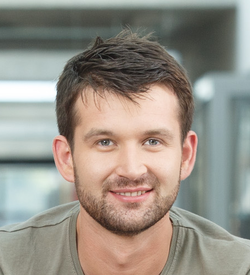About me: Difference between revisions
No edit summary |
No edit summary |
||
| (49 intermediate revisions by the same user not shown) | |||
| Line 1: | Line 1: | ||
[[File:Slavko Žitnik.png|frameless|right]] | [[File:Slavko Žitnik.png|frameless|right|275x275px]] | ||
I am an | I am an associate professor at the University of Ljubljana, Faculty for computer and information science, Laboratory for Data Technologies. My research interests are related to databases, natural language processing, semantic Web, information retrieval and information extraction. I am also teaching courses of natural language processing, web information extraction and retrieval, database design and management and information systems and modelling. | ||
[ | Internationally I actively cooperate with the [https://cri.pantheonsorbonne.fr/en/centre-recherche-en-informatique Université Paris 1, Sorbonne], the [https://www.etf.bg.ac.rs/en School of Electrical Engineering, University of Belgrade] (prof. Dražen Drašković), [https://www.usf.edu/education College of Education, University of South Florida] (prof. Glenn Gordon Smith), and [https://zitniklab.hms.harvard.edu Harvard University, Department of Biomedical Informatics] (prof. Marinka Žitnik). | ||
Apart from research projects in the fields of data science and natural language processing, I am actively engaged in professional projects with industry. | |||
'''Check [{{filepath:SlavkoZitnik_CV.pdf}} regularly updated my curriculum vitae] to find more about me.''' | |||
{{Quote|text=Once you have a truly massive amount of information integrated as knowledge, then the human-software system will be superhuman, in the same sense that mankind with writing (or language itself) is superhuman compared to mankind before writing (or language itself). We look back on pre-linguistic cavemen and think 'they weren't quite human, were they?' In much the same way, our descendants will look back on pre-AI homo sapiens with exactly that mixture of otherness and pity.|sign=Doug Lenat|source=}} | |||
<center>{{note|To get in touch with me, please reach out to me via [mailto:slavko.zitnik@fri.uni-lj.si slavko.zitnik@fri.uni-lj.si] or stop by in my office at the Faculty (room R2.58).}}</center> | |||
:[http://www | ;Affiliations | ||
: | :[http://www.fri.uni-lj.si University of Ljubljana, Faculty of Computer and Information Science], Laboratory for Data Technologies, Autumn 2018-now, Assistant Professor | ||
:[https://dbmi.hms.harvard.edu Harvard University, Department of Biomedical Informatics], 2022, Visiting Professor | |||
;Research indexing | |||
; | : [https://www.arrs.gov.si Slovenian research agency] profile, [https://cris.cobiss.net/ecris/si/sl/researcher/38663 SICRIS number 34156] | ||
: | : [https://scholar.google.com/citations?user=O8WaRkUAAAAJ Google Scholar] | ||
: | |||
{| style="text-align: center; width: 100%;" | |||
| '''Head of the Laboratory''' || '''PhD Candidates''' | |||
|- | |||
|<gallery mode="packed"> | |||
: | Image:Marko_Bajec.png|[http://marko.data-lab.si prof. dr. Marko Bajec] | ||
</gallery> || | |||
<gallery mode="packed" style="padding: 20px;"> | |||
Image:Timotej knez.png|Timotej Knez ''(PhD supervision)'' | |||
Image:Luka_tercon.png|Luka Terčon ''(PhD co-supervision)'' | |||
Image:Person.png|Massimo Sbarbaro ''(PhD co-supervision)'' | |||
</gallery> | |||
== | |} | ||
: | |||
: | |||
Latest revision as of 15:46, 28 February 2025

I am an associate professor at the University of Ljubljana, Faculty for computer and information science, Laboratory for Data Technologies. My research interests are related to databases, natural language processing, semantic Web, information retrieval and information extraction. I am also teaching courses of natural language processing, web information extraction and retrieval, database design and management and information systems and modelling.
Internationally I actively cooperate with the Université Paris 1, Sorbonne, the School of Electrical Engineering, University of Belgrade (prof. Dražen Drašković), College of Education, University of South Florida (prof. Glenn Gordon Smith), and Harvard University, Department of Biomedical Informatics (prof. Marinka Žitnik).
Apart from research projects in the fields of data science and natural language processing, I am actively engaged in professional projects with industry.
Check regularly updated my curriculum vitae to find more about me.
Once you have a truly massive amount of information integrated as knowledge, then the human-software system will be superhuman, in the same sense that mankind with writing (or language itself) is superhuman compared to mankind before writing (or language itself). We look back on pre-linguistic cavemen and think 'they weren't quite human, were they?' In much the same way, our descendants will look back on pre-AI homo sapiens with exactly that mixture of otherness and pity.—Doug Lenat
- Affiliations
- University of Ljubljana, Faculty of Computer and Information Science, Laboratory for Data Technologies, Autumn 2018-now, Assistant Professor
- Harvard University, Department of Biomedical Informatics, 2022, Visiting Professor
- Research indexing
- Slovenian research agency profile, SICRIS number 34156
- Google Scholar
| Head of the Laboratory | PhD Candidates |
|



